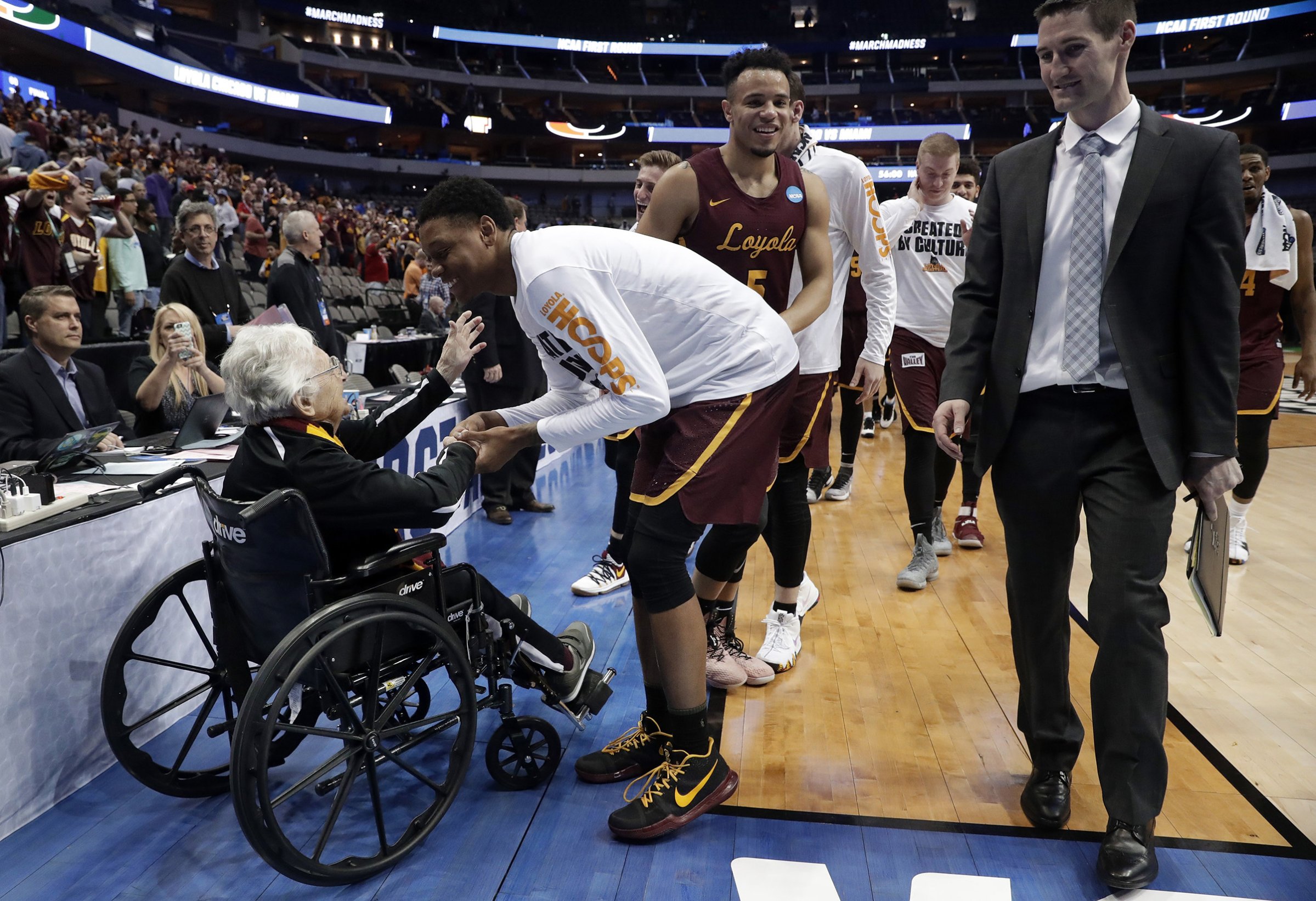
Quick, and be honest now: When you filled out your March Madness bracket a few weeks back, along with millions of your fellow Americans, did you actually pick 16th-seeded University of Maryland, Baltimore County to upset the University of Virginia, the top team in the entire NCAA men’s basketball tournament? Or Loyola University Chicago to knock off a string of bigger-name and better-funded programs on its way to the Final Four, which tips off on March 31 in San Antonio? And you certainly didn’t put any money on a 98-year-old nun emerging as the biggest celebrity of all, right?
No, of course you didn’t. No one saw UMBC’s win coming–the first time a top seed has lost in the first round–nor were we prepared for the joy that is Sister Jean Dolores Schmidt, Loyola-Chicago’s team chaplain, who has inspired her underdog charges while throwing shade at brash college hoops analyst Charles Barkley in a national television interview.
This is a March Madness for the ages–which only makes the hypocrisy surrounding the tournament all the more troubling.
In 2016–17, revenue for the NCAA, the nonprofit organization that oversees major college sports, exceeded $1 billion for the first time. Broadcast rights to the men’s basketball tournament alone delivered $761 million of that haul. The NCAA goes out of its way to protect the financial interests of its tournament sponsors. All members of the media sitting courtside at games, for example, are required to pour their drinks into Powerade cups, since parent company Coca-Cola is an NCAA “corporate champion.”
Meanwhile, the NCAA takes extraordinary measures to impede the financial interests of the tournament’s main attraction: the players. The organization’s amateurism rules prohibit student-athletes from earning any money above a stipend that covers the cost of living at school. Yes, players receive athletic scholarships that cover hefty tuition bills. That’s a valuable prize. But the vast majority of the kids lighting up your TV screen were recruited to their school to play basketball, not study chemistry. And don’t think they don’t know it.
While players are governed by draconian rules, coaches can enjoy the fruits of the free market. The University of Connecticut, for example, just lured coach Danny Hurley with a six-year contract worth roughly $3 million a year. Coaches are also free to profit from their celebrity by giving paid speeches, hawking branded products or selling instructional videos.
This disparity is all the more unseemly since the FBI has started nosing around college basketball’s shady underbelly. The ongoing federal probe has led to the arrests of assistant coaches and corporate-marketing representatives who allegedly arranged under-the-table deals to steer promising players to certain schools or tie them to financial advisers after turning pro. The scandal led the University of Louisville to fire Hall of Fame coach Rick Pitino after $100,000 was allegedly funneled to the family of a top prospect in exchange for his commitment to the school. Pitino has denied knowing about such a payment.
This black market is a direct result of the NCAA’s outdated restrictions. If a school thinks a player is worth six figures, then that player should have a right to maximize his earning power. Even if the NCAA refuses to allow players a fairer share of its $1 billion pie, the organization could permit them to earn money through sponsorships with shoe companies or local car dealerships.
So does this mean we are all a bunch of March Madness–loving, binge-viewing-at-work hypocrites? Without a doubt. But decrying the injustice of big-time basketball’s amateurism rules doesn’t mean you have to stop fueling the college sports economy. March Madness is the greatest guilty pleasure in sports. After all, the NCAA knows what it’s got: there’s a reason TV rights to the tournament will increase to about $879 million in 2019, a 16% jump over two years. So please forgive us, Sister Jean, while we root on for Cinderella.
More Must-Reads From TIME
- The 100 Most Influential People of 2024
- Coco Gauff Is Playing for Herself Now
- Scenes From Pro-Palestinian Encampments Across U.S. Universities
- 6 Compliments That Land Every Time
- If You're Dating Right Now , You're Brave: Column
- The AI That Could Heal a Divided Internet
- Fallout Is a Brilliant Model for the Future of Video Game Adaptations
- Want Weekly Recs on What to Watch, Read, and More? Sign Up for Worth Your Time
Write to Sean Gregory at sean.gregory@time.com